Report on The Developing Manager: Skills, Styles, and Strategies
VerifiedAdded on 2020/01/15
|15
|5106
|139
Report
AI Summary
This report delves into the multifaceted role of a developing manager, analyzing various management styles such as authoritative, participative, free-rein, and affiliative, using Thomas Cook and Hilton Hotels as case studies. It explores essential leadership characteristics, including communication skills, team orientation, charisma, and innovation, and examines the communication processes within organizations. The report further analyzes organizational culture, differentiating between power, role, and task cultures. It assesses the author's personal management skills, including communication, decision-making, problem-solving, and leadership, and outlines a personal development plan to enhance these skills for career advancement within the hospitality and tourism sectors. The report provides recommendations for goal achievement and improvements in managerial decision-making, supporting career development through the identification of current and future needs.
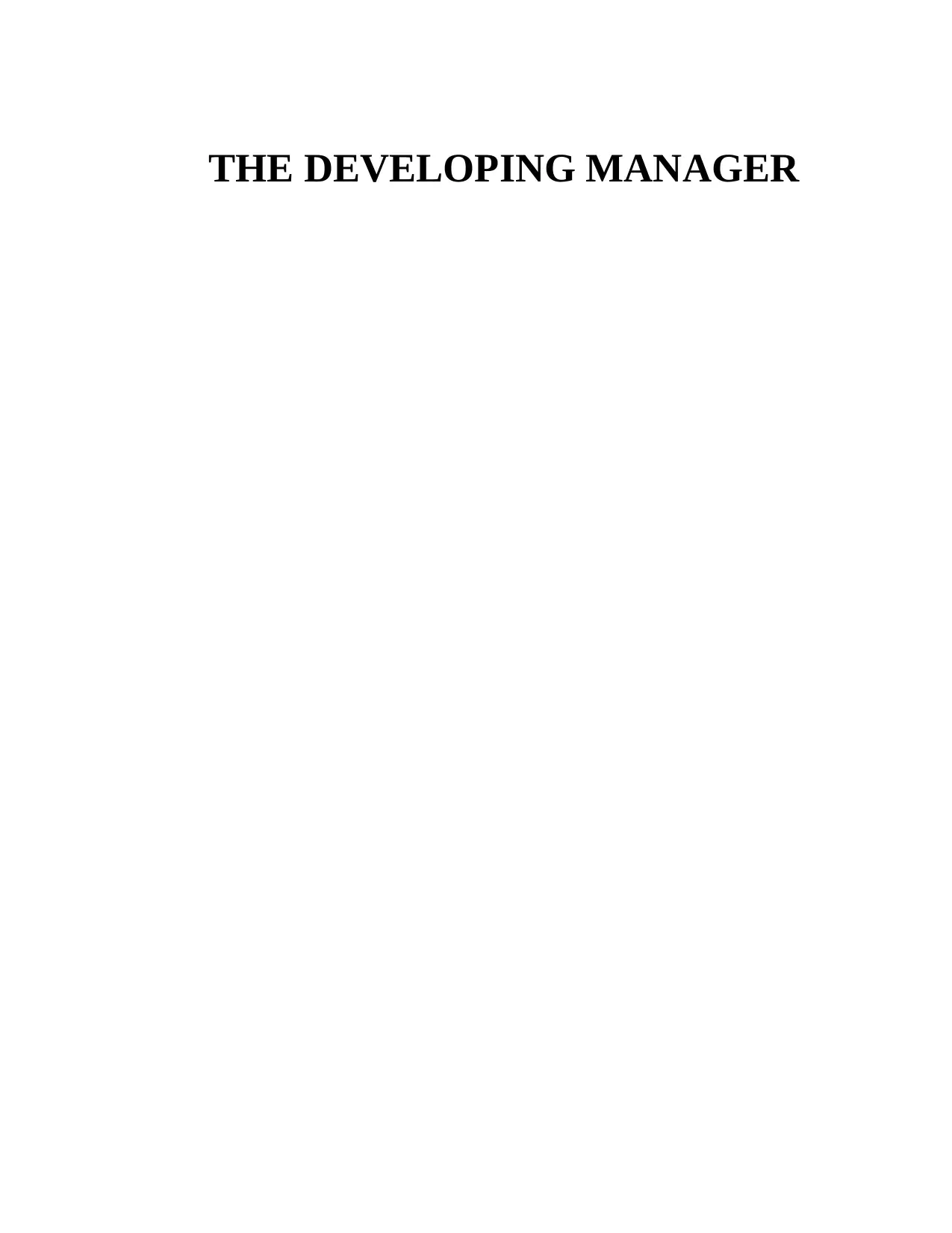
THE DEVELOPING MANAGER
Paraphrase This Document
Need a fresh take? Get an instant paraphrase of this document with our AI Paraphraser
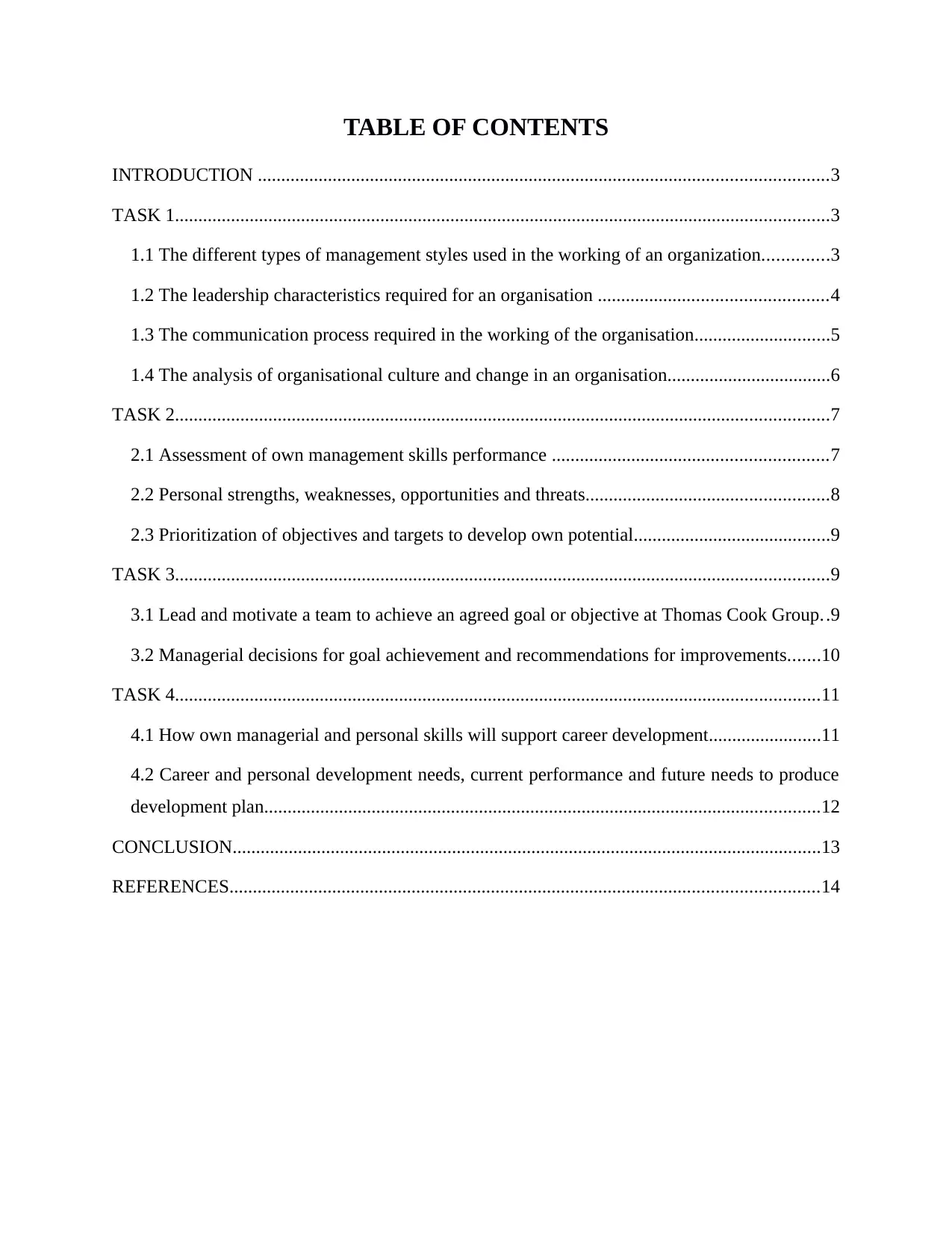
TABLE OF CONTENTS
INTRODUCTION ..........................................................................................................................3
TASK 1............................................................................................................................................3
1.1 The different types of management styles used in the working of an organization..............3
1.2 The leadership characteristics required for an organisation .................................................4
1.3 The communication process required in the working of the organisation.............................5
1.4 The analysis of organisational culture and change in an organisation...................................6
TASK 2............................................................................................................................................7
2.1 Assessment of own management skills performance ...........................................................7
2.2 Personal strengths, weaknesses, opportunities and threats....................................................8
2.3 Prioritization of objectives and targets to develop own potential..........................................9
TASK 3............................................................................................................................................9
3.1 Lead and motivate a team to achieve an agreed goal or objective at Thomas Cook Group..9
3.2 Managerial decisions for goal achievement and recommendations for improvements.......10
TASK 4..........................................................................................................................................11
4.1 How own managerial and personal skills will support career development........................11
4.2 Career and personal development needs, current performance and future needs to produce
development plan.......................................................................................................................12
CONCLUSION..............................................................................................................................13
REFERENCES..............................................................................................................................14
INTRODUCTION ..........................................................................................................................3
TASK 1............................................................................................................................................3
1.1 The different types of management styles used in the working of an organization..............3
1.2 The leadership characteristics required for an organisation .................................................4
1.3 The communication process required in the working of the organisation.............................5
1.4 The analysis of organisational culture and change in an organisation...................................6
TASK 2............................................................................................................................................7
2.1 Assessment of own management skills performance ...........................................................7
2.2 Personal strengths, weaknesses, opportunities and threats....................................................8
2.3 Prioritization of objectives and targets to develop own potential..........................................9
TASK 3............................................................................................................................................9
3.1 Lead and motivate a team to achieve an agreed goal or objective at Thomas Cook Group..9
3.2 Managerial decisions for goal achievement and recommendations for improvements.......10
TASK 4..........................................................................................................................................11
4.1 How own managerial and personal skills will support career development........................11
4.2 Career and personal development needs, current performance and future needs to produce
development plan.......................................................................................................................12
CONCLUSION..............................................................................................................................13
REFERENCES..............................................................................................................................14
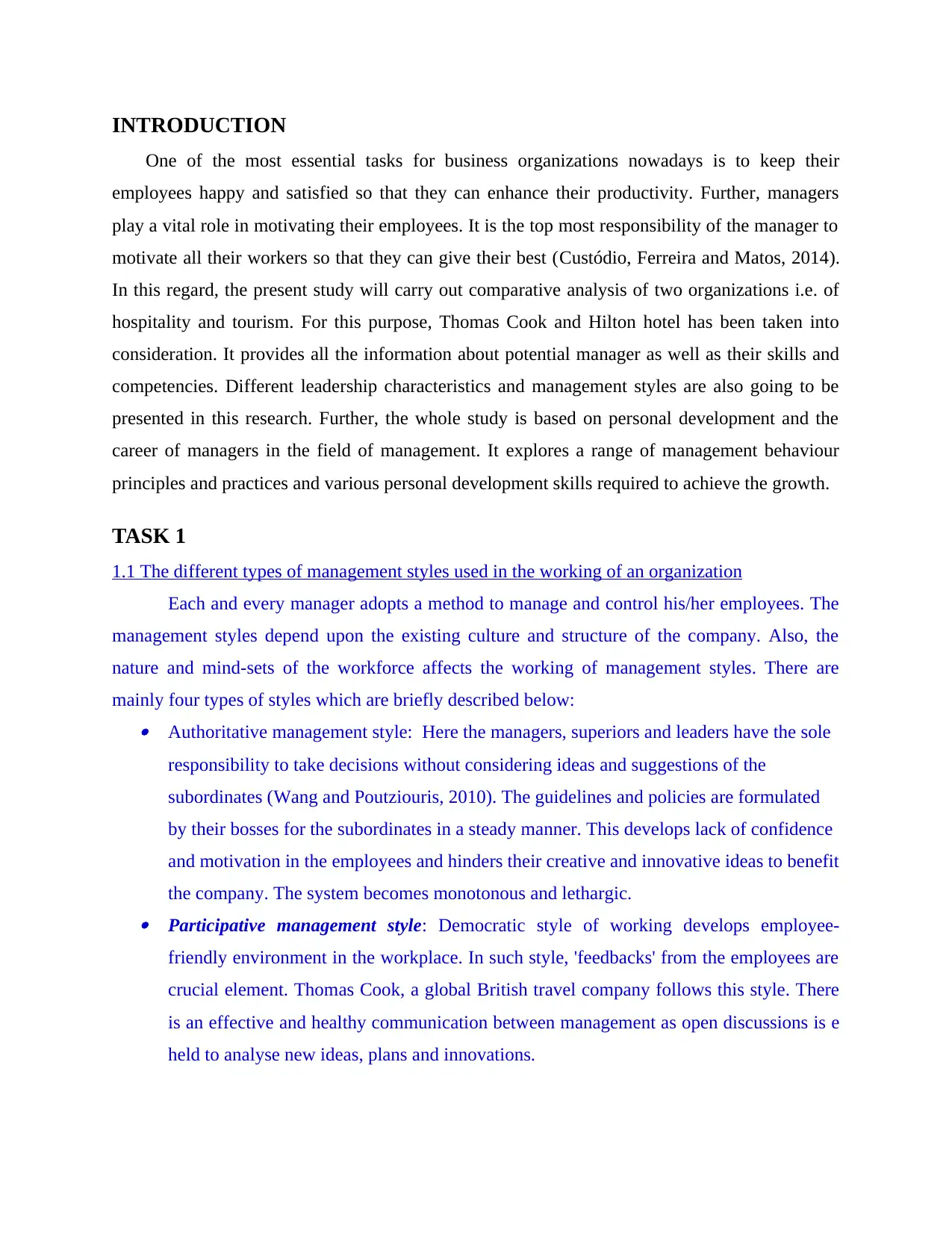
INTRODUCTION
One of the most essential tasks for business organizations nowadays is to keep their
employees happy and satisfied so that they can enhance their productivity. Further, managers
play a vital role in motivating their employees. It is the top most responsibility of the manager to
motivate all their workers so that they can give their best (Custódio, Ferreira and Matos, 2014).
In this regard, the present study will carry out comparative analysis of two organizations i.e. of
hospitality and tourism. For this purpose, Thomas Cook and Hilton hotel has been taken into
consideration. It provides all the information about potential manager as well as their skills and
competencies. Different leadership characteristics and management styles are also going to be
presented in this research. Further, the whole study is based on personal development and the
career of managers in the field of management. It explores a range of management behaviour
principles and practices and various personal development skills required to achieve the growth.
TASK 1
1.1 The different types of management styles used in the working of an organization
Each and every manager adopts a method to manage and control his/her employees. The
management styles depend upon the existing culture and structure of the company. Also, the
nature and mind-sets of the workforce affects the working of management styles. There are
mainly four types of styles which are briefly described below: Authoritative management style: Here the managers, superiors and leaders have the sole
responsibility to take decisions without considering ideas and suggestions of the
subordinates (Wang and Poutziouris, 2010). The guidelines and policies are formulated
by their bosses for the subordinates in a steady manner. This develops lack of confidence
and motivation in the employees and hinders their creative and innovative ideas to benefit
the company. The system becomes monotonous and lethargic. Participative management style: Democratic style of working develops employee-
friendly environment in the workplace. In such style, 'feedbacks' from the employees are
crucial element. Thomas Cook, a global British travel company follows this style. There
is an effective and healthy communication between management as open discussions is e
held to analyse new ideas, plans and innovations.
One of the most essential tasks for business organizations nowadays is to keep their
employees happy and satisfied so that they can enhance their productivity. Further, managers
play a vital role in motivating their employees. It is the top most responsibility of the manager to
motivate all their workers so that they can give their best (Custódio, Ferreira and Matos, 2014).
In this regard, the present study will carry out comparative analysis of two organizations i.e. of
hospitality and tourism. For this purpose, Thomas Cook and Hilton hotel has been taken into
consideration. It provides all the information about potential manager as well as their skills and
competencies. Different leadership characteristics and management styles are also going to be
presented in this research. Further, the whole study is based on personal development and the
career of managers in the field of management. It explores a range of management behaviour
principles and practices and various personal development skills required to achieve the growth.
TASK 1
1.1 The different types of management styles used in the working of an organization
Each and every manager adopts a method to manage and control his/her employees. The
management styles depend upon the existing culture and structure of the company. Also, the
nature and mind-sets of the workforce affects the working of management styles. There are
mainly four types of styles which are briefly described below: Authoritative management style: Here the managers, superiors and leaders have the sole
responsibility to take decisions without considering ideas and suggestions of the
subordinates (Wang and Poutziouris, 2010). The guidelines and policies are formulated
by their bosses for the subordinates in a steady manner. This develops lack of confidence
and motivation in the employees and hinders their creative and innovative ideas to benefit
the company. The system becomes monotonous and lethargic. Participative management style: Democratic style of working develops employee-
friendly environment in the workplace. In such style, 'feedbacks' from the employees are
crucial element. Thomas Cook, a global British travel company follows this style. There
is an effective and healthy communication between management as open discussions is e
held to analyse new ideas, plans and innovations.
⊘ This is a preview!⊘
Do you want full access?
Subscribe today to unlock all pages.

Trusted by 1+ million students worldwide
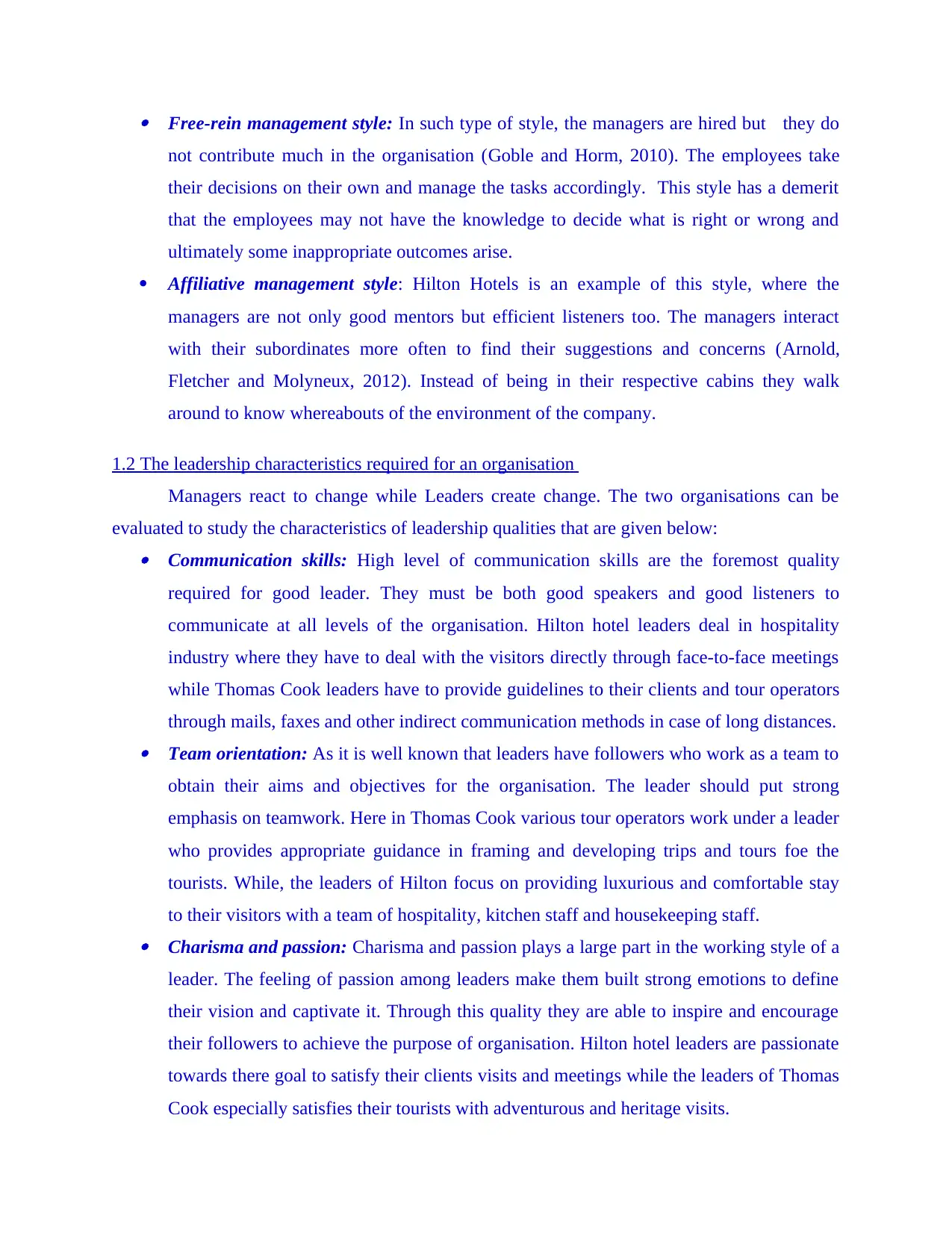
Free-rein management style: In such type of style, the managers are hired but they do
not contribute much in the organisation (Goble and Horm, 2010). The employees take
their decisions on their own and manage the tasks accordingly. This style has a demerit
that the employees may not have the knowledge to decide what is right or wrong and
ultimately some inappropriate outcomes arise.
Affiliative management style: Hilton Hotels is an example of this style, where the
managers are not only good mentors but efficient listeners too. The managers interact
with their subordinates more often to find their suggestions and concerns (Arnold,
Fletcher and Molyneux, 2012). Instead of being in their respective cabins they walk
around to know whereabouts of the environment of the company.
1.2 The leadership characteristics required for an organisation
Managers react to change while Leaders create change. The two organisations can be
evaluated to study the characteristics of leadership qualities that are given below: Communication skills: High level of communication skills are the foremost quality
required for good leader. They must be both good speakers and good listeners to
communicate at all levels of the organisation. Hilton hotel leaders deal in hospitality
industry where they have to deal with the visitors directly through face-to-face meetings
while Thomas Cook leaders have to provide guidelines to their clients and tour operators
through mails, faxes and other indirect communication methods in case of long distances. Team orientation: As it is well known that leaders have followers who work as a team to
obtain their aims and objectives for the organisation. The leader should put strong
emphasis on teamwork. Here in Thomas Cook various tour operators work under a leader
who provides appropriate guidance in framing and developing trips and tours foe the
tourists. While, the leaders of Hilton focus on providing luxurious and comfortable stay
to their visitors with a team of hospitality, kitchen staff and housekeeping staff. Charisma and passion: Charisma and passion plays a large part in the working style of a
leader. The feeling of passion among leaders make them built strong emotions to define
their vision and captivate it. Through this quality they are able to inspire and encourage
their followers to achieve the purpose of organisation. Hilton hotel leaders are passionate
towards there goal to satisfy their clients visits and meetings while the leaders of Thomas
Cook especially satisfies their tourists with adventurous and heritage visits.
not contribute much in the organisation (Goble and Horm, 2010). The employees take
their decisions on their own and manage the tasks accordingly. This style has a demerit
that the employees may not have the knowledge to decide what is right or wrong and
ultimately some inappropriate outcomes arise.
Affiliative management style: Hilton Hotels is an example of this style, where the
managers are not only good mentors but efficient listeners too. The managers interact
with their subordinates more often to find their suggestions and concerns (Arnold,
Fletcher and Molyneux, 2012). Instead of being in their respective cabins they walk
around to know whereabouts of the environment of the company.
1.2 The leadership characteristics required for an organisation
Managers react to change while Leaders create change. The two organisations can be
evaluated to study the characteristics of leadership qualities that are given below: Communication skills: High level of communication skills are the foremost quality
required for good leader. They must be both good speakers and good listeners to
communicate at all levels of the organisation. Hilton hotel leaders deal in hospitality
industry where they have to deal with the visitors directly through face-to-face meetings
while Thomas Cook leaders have to provide guidelines to their clients and tour operators
through mails, faxes and other indirect communication methods in case of long distances. Team orientation: As it is well known that leaders have followers who work as a team to
obtain their aims and objectives for the organisation. The leader should put strong
emphasis on teamwork. Here in Thomas Cook various tour operators work under a leader
who provides appropriate guidance in framing and developing trips and tours foe the
tourists. While, the leaders of Hilton focus on providing luxurious and comfortable stay
to their visitors with a team of hospitality, kitchen staff and housekeeping staff. Charisma and passion: Charisma and passion plays a large part in the working style of a
leader. The feeling of passion among leaders make them built strong emotions to define
their vision and captivate it. Through this quality they are able to inspire and encourage
their followers to achieve the purpose of organisation. Hilton hotel leaders are passionate
towards there goal to satisfy their clients visits and meetings while the leaders of Thomas
Cook especially satisfies their tourists with adventurous and heritage visits.
Paraphrase This Document
Need a fresh take? Get an instant paraphrase of this document with our AI Paraphraser
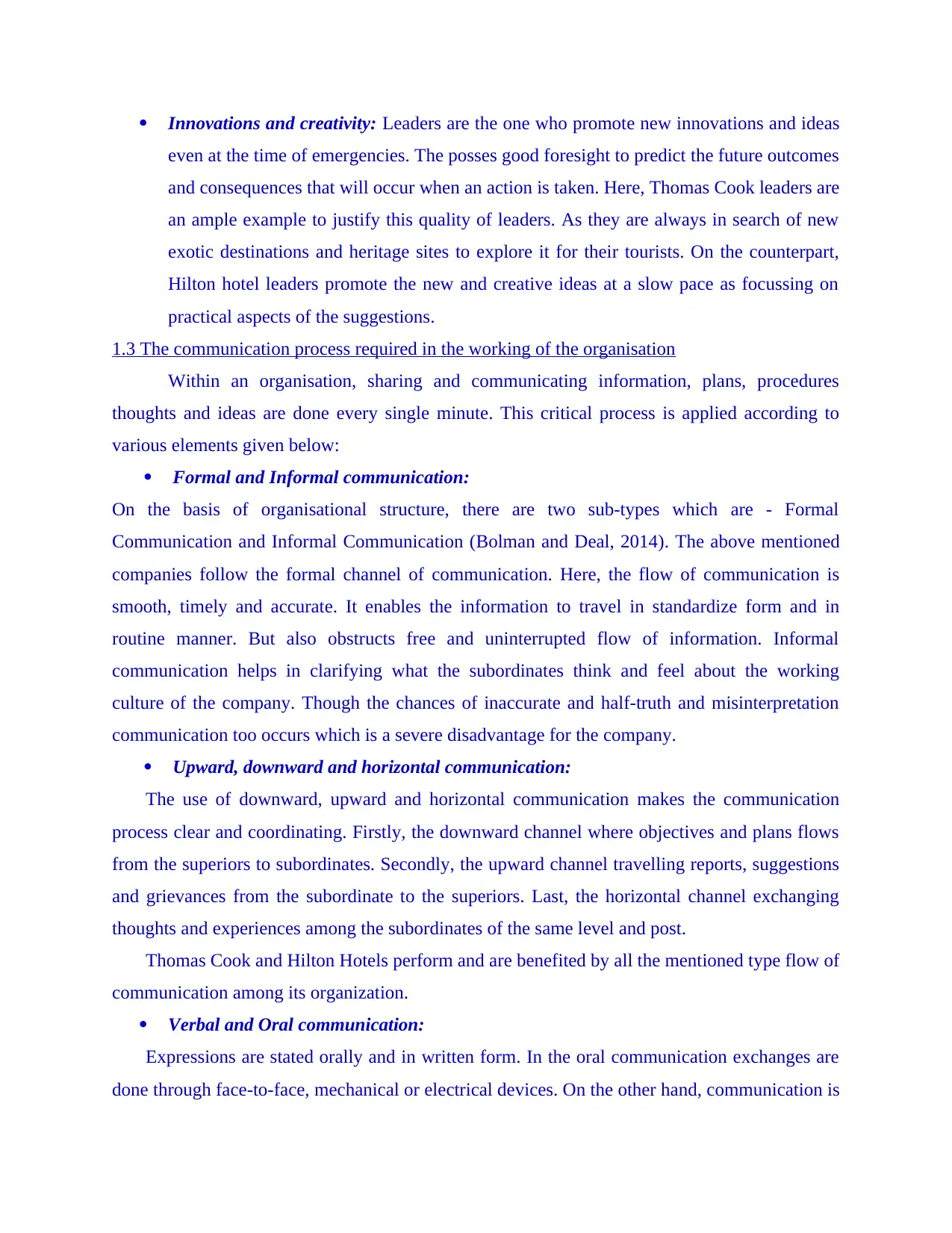
Innovations and creativity: Leaders are the one who promote new innovations and ideas
even at the time of emergencies. The posses good foresight to predict the future outcomes
and consequences that will occur when an action is taken. Here, Thomas Cook leaders are
an ample example to justify this quality of leaders. As they are always in search of new
exotic destinations and heritage sites to explore it for their tourists. On the counterpart,
Hilton hotel leaders promote the new and creative ideas at a slow pace as focussing on
practical aspects of the suggestions.
1.3 The communication process required in the working of the organisation
Within an organisation, sharing and communicating information, plans, procedures
thoughts and ideas are done every single minute. This critical process is applied according to
various elements given below:
Formal and Informal communication:
On the basis of organisational structure, there are two sub-types which are - Formal
Communication and Informal Communication (Bolman and Deal, 2014). The above mentioned
companies follow the formal channel of communication. Here, the flow of communication is
smooth, timely and accurate. It enables the information to travel in standardize form and in
routine manner. But also obstructs free and uninterrupted flow of information. Informal
communication helps in clarifying what the subordinates think and feel about the working
culture of the company. Though the chances of inaccurate and half-truth and misinterpretation
communication too occurs which is a severe disadvantage for the company.
Upward, downward and horizontal communication:
The use of downward, upward and horizontal communication makes the communication
process clear and coordinating. Firstly, the downward channel where objectives and plans flows
from the superiors to subordinates. Secondly, the upward channel travelling reports, suggestions
and grievances from the subordinate to the superiors. Last, the horizontal channel exchanging
thoughts and experiences among the subordinates of the same level and post.
Thomas Cook and Hilton Hotels perform and are benefited by all the mentioned type flow of
communication among its organization.
Verbal and Oral communication:
Expressions are stated orally and in written form. In the oral communication exchanges are
done through face-to-face, mechanical or electrical devices. On the other hand, communication is
even at the time of emergencies. The posses good foresight to predict the future outcomes
and consequences that will occur when an action is taken. Here, Thomas Cook leaders are
an ample example to justify this quality of leaders. As they are always in search of new
exotic destinations and heritage sites to explore it for their tourists. On the counterpart,
Hilton hotel leaders promote the new and creative ideas at a slow pace as focussing on
practical aspects of the suggestions.
1.3 The communication process required in the working of the organisation
Within an organisation, sharing and communicating information, plans, procedures
thoughts and ideas are done every single minute. This critical process is applied according to
various elements given below:
Formal and Informal communication:
On the basis of organisational structure, there are two sub-types which are - Formal
Communication and Informal Communication (Bolman and Deal, 2014). The above mentioned
companies follow the formal channel of communication. Here, the flow of communication is
smooth, timely and accurate. It enables the information to travel in standardize form and in
routine manner. But also obstructs free and uninterrupted flow of information. Informal
communication helps in clarifying what the subordinates think and feel about the working
culture of the company. Though the chances of inaccurate and half-truth and misinterpretation
communication too occurs which is a severe disadvantage for the company.
Upward, downward and horizontal communication:
The use of downward, upward and horizontal communication makes the communication
process clear and coordinating. Firstly, the downward channel where objectives and plans flows
from the superiors to subordinates. Secondly, the upward channel travelling reports, suggestions
and grievances from the subordinate to the superiors. Last, the horizontal channel exchanging
thoughts and experiences among the subordinates of the same level and post.
Thomas Cook and Hilton Hotels perform and are benefited by all the mentioned type flow of
communication among its organization.
Verbal and Oral communication:
Expressions are stated orally and in written form. In the oral communication exchanges are
done through face-to-face, mechanical or electrical devices. On the other hand, communication is
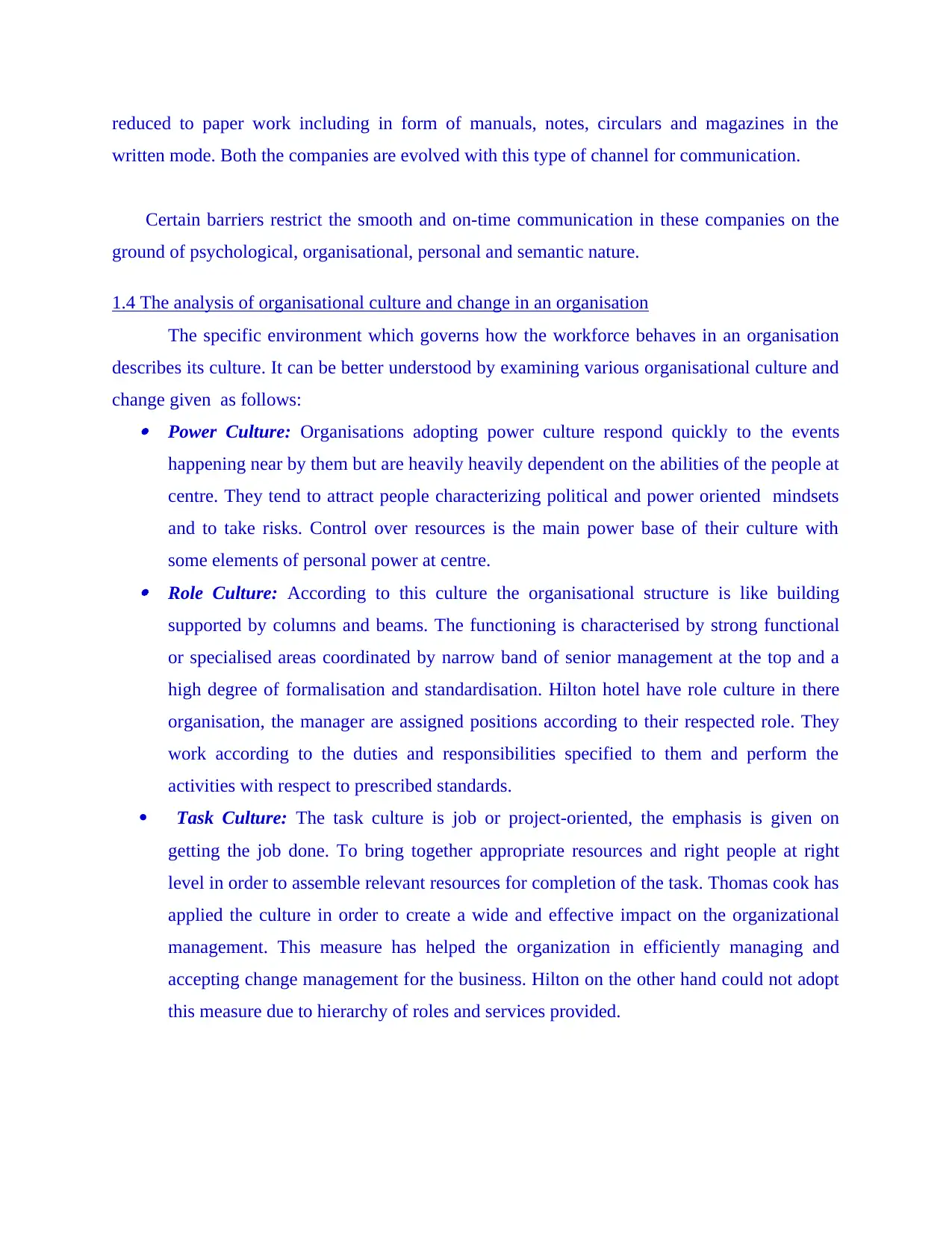
reduced to paper work including in form of manuals, notes, circulars and magazines in the
written mode. Both the companies are evolved with this type of channel for communication.
Certain barriers restrict the smooth and on-time communication in these companies on the
ground of psychological, organisational, personal and semantic nature.
1.4 The analysis of organisational culture and change in an organisation
The specific environment which governs how the workforce behaves in an organisation
describes its culture. It can be better understood by examining various organisational culture and
change given as follows: Power Culture: Organisations adopting power culture respond quickly to the events
happening near by them but are heavily heavily dependent on the abilities of the people at
centre. They tend to attract people characterizing political and power oriented mindsets
and to take risks. Control over resources is the main power base of their culture with
some elements of personal power at centre. Role Culture: According to this culture the organisational structure is like building
supported by columns and beams. The functioning is characterised by strong functional
or specialised areas coordinated by narrow band of senior management at the top and a
high degree of formalisation and standardisation. Hilton hotel have role culture in there
organisation, the manager are assigned positions according to their respected role. They
work according to the duties and responsibilities specified to them and perform the
activities with respect to prescribed standards.
Task Culture: The task culture is job or project-oriented, the emphasis is given on
getting the job done. To bring together appropriate resources and right people at right
level in order to assemble relevant resources for completion of the task. Thomas cook has
applied the culture in order to create a wide and effective impact on the organizational
management. This measure has helped the organization in efficiently managing and
accepting change management for the business. Hilton on the other hand could not adopt
this measure due to hierarchy of roles and services provided.
written mode. Both the companies are evolved with this type of channel for communication.
Certain barriers restrict the smooth and on-time communication in these companies on the
ground of psychological, organisational, personal and semantic nature.
1.4 The analysis of organisational culture and change in an organisation
The specific environment which governs how the workforce behaves in an organisation
describes its culture. It can be better understood by examining various organisational culture and
change given as follows: Power Culture: Organisations adopting power culture respond quickly to the events
happening near by them but are heavily heavily dependent on the abilities of the people at
centre. They tend to attract people characterizing political and power oriented mindsets
and to take risks. Control over resources is the main power base of their culture with
some elements of personal power at centre. Role Culture: According to this culture the organisational structure is like building
supported by columns and beams. The functioning is characterised by strong functional
or specialised areas coordinated by narrow band of senior management at the top and a
high degree of formalisation and standardisation. Hilton hotel have role culture in there
organisation, the manager are assigned positions according to their respected role. They
work according to the duties and responsibilities specified to them and perform the
activities with respect to prescribed standards.
Task Culture: The task culture is job or project-oriented, the emphasis is given on
getting the job done. To bring together appropriate resources and right people at right
level in order to assemble relevant resources for completion of the task. Thomas cook has
applied the culture in order to create a wide and effective impact on the organizational
management. This measure has helped the organization in efficiently managing and
accepting change management for the business. Hilton on the other hand could not adopt
this measure due to hierarchy of roles and services provided.
⊘ This is a preview!⊘
Do you want full access?
Subscribe today to unlock all pages.

Trusted by 1+ million students worldwide
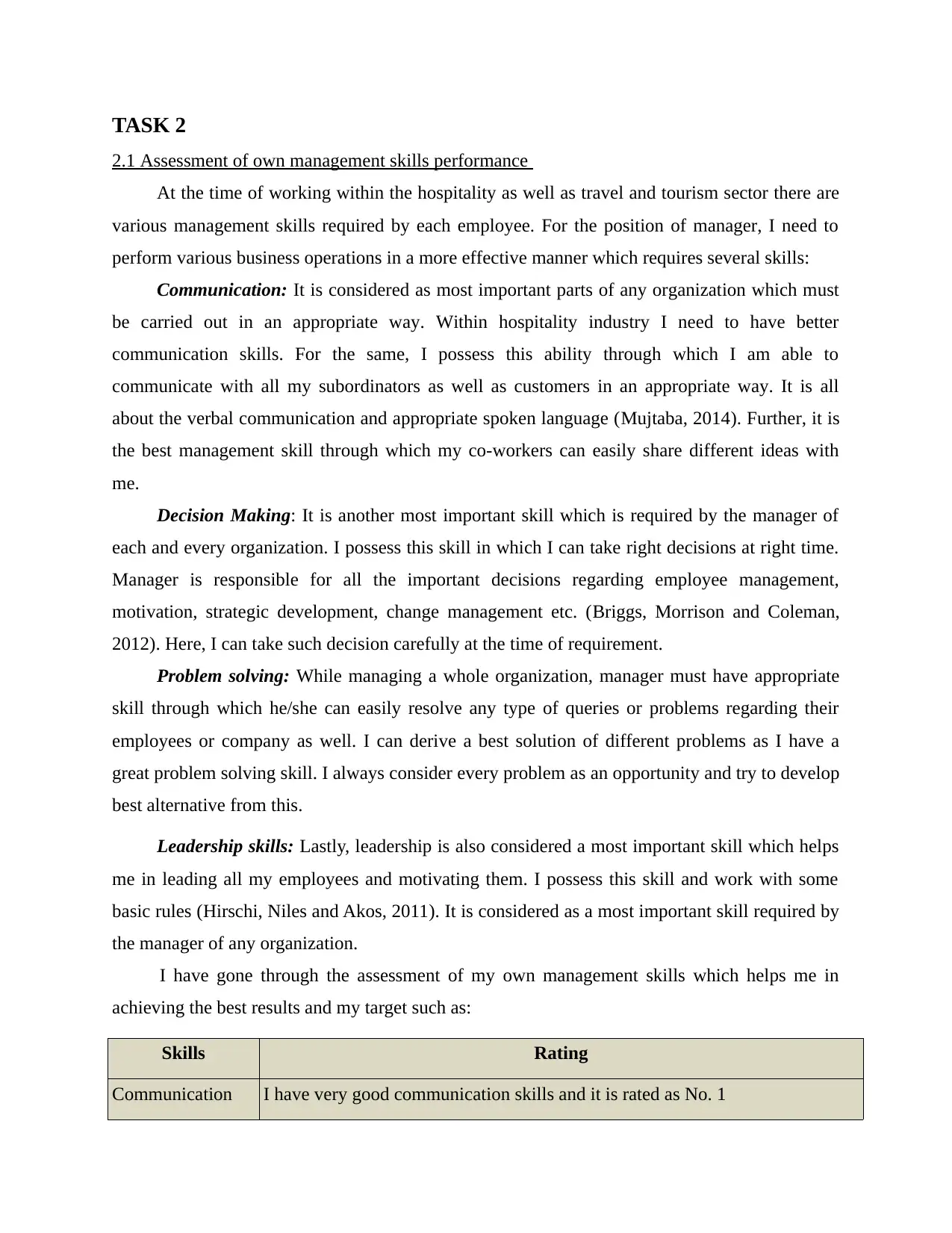
TASK 2
2.1 Assessment of own management skills performance
At the time of working within the hospitality as well as travel and tourism sector there are
various management skills required by each employee. For the position of manager, I need to
perform various business operations in a more effective manner which requires several skills:
Communication: It is considered as most important parts of any organization which must
be carried out in an appropriate way. Within hospitality industry I need to have better
communication skills. For the same, I possess this ability through which I am able to
communicate with all my subordinators as well as customers in an appropriate way. It is all
about the verbal communication and appropriate spoken language (Mujtaba, 2014). Further, it is
the best management skill through which my co-workers can easily share different ideas with
me.
Decision Making: It is another most important skill which is required by the manager of
each and every organization. I possess this skill in which I can take right decisions at right time.
Manager is responsible for all the important decisions regarding employee management,
motivation, strategic development, change management etc. (Briggs, Morrison and Coleman,
2012). Here, I can take such decision carefully at the time of requirement.
Problem solving: While managing a whole organization, manager must have appropriate
skill through which he/she can easily resolve any type of queries or problems regarding their
employees or company as well. I can derive a best solution of different problems as I have a
great problem solving skill. I always consider every problem as an opportunity and try to develop
best alternative from this.
Leadership skills: Lastly, leadership is also considered a most important skill which helps
me in leading all my employees and motivating them. I possess this skill and work with some
basic rules (Hirschi, Niles and Akos, 2011). It is considered as a most important skill required by
the manager of any organization.
I have gone through the assessment of my own management skills which helps me in
achieving the best results and my target such as:
Skills Rating
Communication I have very good communication skills and it is rated as No. 1
2.1 Assessment of own management skills performance
At the time of working within the hospitality as well as travel and tourism sector there are
various management skills required by each employee. For the position of manager, I need to
perform various business operations in a more effective manner which requires several skills:
Communication: It is considered as most important parts of any organization which must
be carried out in an appropriate way. Within hospitality industry I need to have better
communication skills. For the same, I possess this ability through which I am able to
communicate with all my subordinators as well as customers in an appropriate way. It is all
about the verbal communication and appropriate spoken language (Mujtaba, 2014). Further, it is
the best management skill through which my co-workers can easily share different ideas with
me.
Decision Making: It is another most important skill which is required by the manager of
each and every organization. I possess this skill in which I can take right decisions at right time.
Manager is responsible for all the important decisions regarding employee management,
motivation, strategic development, change management etc. (Briggs, Morrison and Coleman,
2012). Here, I can take such decision carefully at the time of requirement.
Problem solving: While managing a whole organization, manager must have appropriate
skill through which he/she can easily resolve any type of queries or problems regarding their
employees or company as well. I can derive a best solution of different problems as I have a
great problem solving skill. I always consider every problem as an opportunity and try to develop
best alternative from this.
Leadership skills: Lastly, leadership is also considered a most important skill which helps
me in leading all my employees and motivating them. I possess this skill and work with some
basic rules (Hirschi, Niles and Akos, 2011). It is considered as a most important skill required by
the manager of any organization.
I have gone through the assessment of my own management skills which helps me in
achieving the best results and my target such as:
Skills Rating
Communication I have very good communication skills and it is rated as No. 1
Paraphrase This Document
Need a fresh take? Get an instant paraphrase of this document with our AI Paraphraser
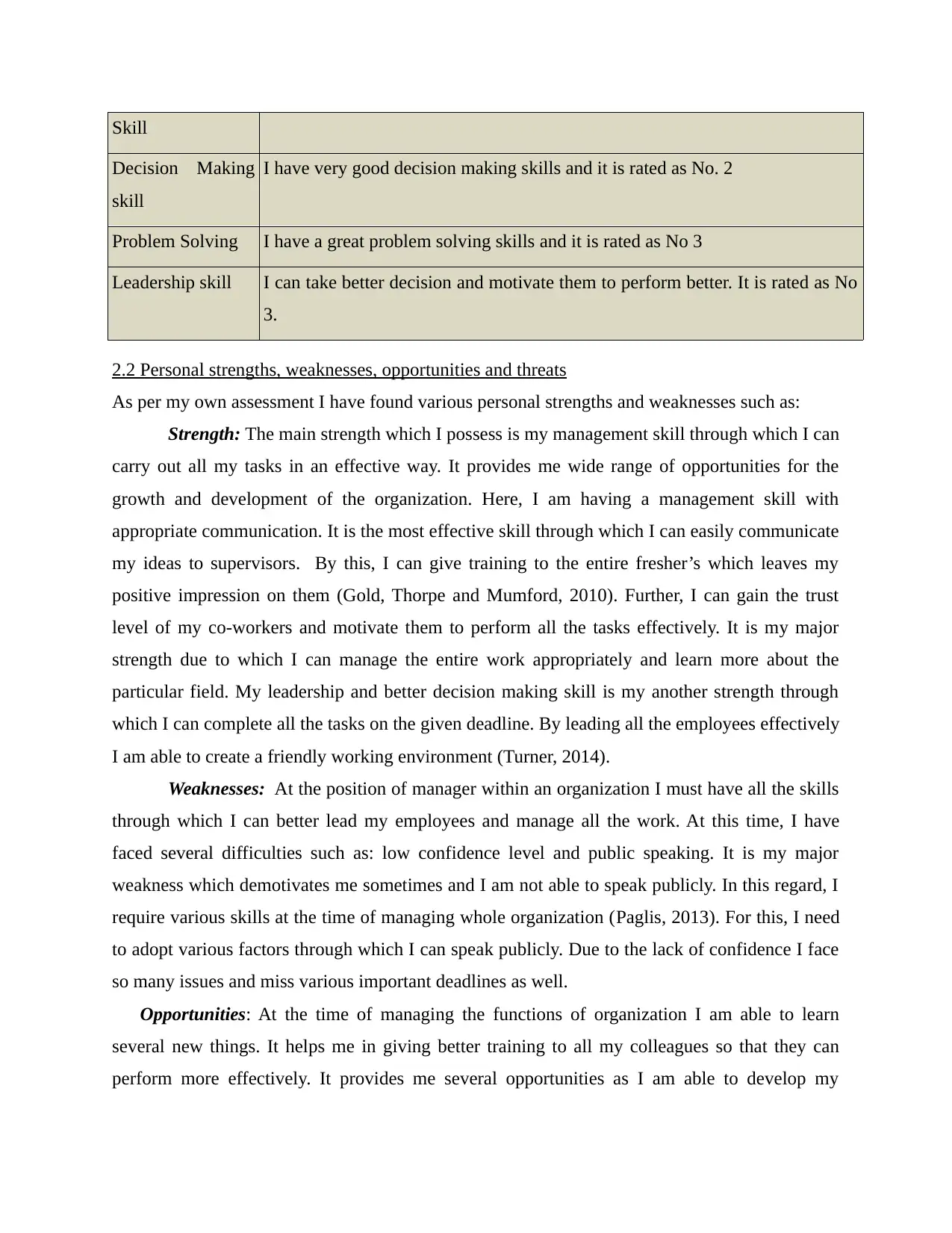
Skill
Decision Making
skill
I have very good decision making skills and it is rated as No. 2
Problem Solving I have a great problem solving skills and it is rated as No 3
Leadership skill I can take better decision and motivate them to perform better. It is rated as No
3.
2.2 Personal strengths, weaknesses, opportunities and threats
As per my own assessment I have found various personal strengths and weaknesses such as:
Strength: The main strength which I possess is my management skill through which I can
carry out all my tasks in an effective way. It provides me wide range of opportunities for the
growth and development of the organization. Here, I am having a management skill with
appropriate communication. It is the most effective skill through which I can easily communicate
my ideas to supervisors. By this, I can give training to the entire fresher’s which leaves my
positive impression on them (Gold, Thorpe and Mumford, 2010). Further, I can gain the trust
level of my co-workers and motivate them to perform all the tasks effectively. It is my major
strength due to which I can manage the entire work appropriately and learn more about the
particular field. My leadership and better decision making skill is my another strength through
which I can complete all the tasks on the given deadline. By leading all the employees effectively
I am able to create a friendly working environment (Turner, 2014).
Weaknesses: At the position of manager within an organization I must have all the skills
through which I can better lead my employees and manage all the work. At this time, I have
faced several difficulties such as: low confidence level and public speaking. It is my major
weakness which demotivates me sometimes and I am not able to speak publicly. In this regard, I
require various skills at the time of managing whole organization (Paglis, 2013). For this, I need
to adopt various factors through which I can speak publicly. Due to the lack of confidence I face
so many issues and miss various important deadlines as well.
Opportunities: At the time of managing the functions of organization I am able to learn
several new things. It helps me in giving better training to all my colleagues so that they can
perform more effectively. It provides me several opportunities as I am able to develop my
Decision Making
skill
I have very good decision making skills and it is rated as No. 2
Problem Solving I have a great problem solving skills and it is rated as No 3
Leadership skill I can take better decision and motivate them to perform better. It is rated as No
3.
2.2 Personal strengths, weaknesses, opportunities and threats
As per my own assessment I have found various personal strengths and weaknesses such as:
Strength: The main strength which I possess is my management skill through which I can
carry out all my tasks in an effective way. It provides me wide range of opportunities for the
growth and development of the organization. Here, I am having a management skill with
appropriate communication. It is the most effective skill through which I can easily communicate
my ideas to supervisors. By this, I can give training to the entire fresher’s which leaves my
positive impression on them (Gold, Thorpe and Mumford, 2010). Further, I can gain the trust
level of my co-workers and motivate them to perform all the tasks effectively. It is my major
strength due to which I can manage the entire work appropriately and learn more about the
particular field. My leadership and better decision making skill is my another strength through
which I can complete all the tasks on the given deadline. By leading all the employees effectively
I am able to create a friendly working environment (Turner, 2014).
Weaknesses: At the position of manager within an organization I must have all the skills
through which I can better lead my employees and manage all the work. At this time, I have
faced several difficulties such as: low confidence level and public speaking. It is my major
weakness which demotivates me sometimes and I am not able to speak publicly. In this regard, I
require various skills at the time of managing whole organization (Paglis, 2013). For this, I need
to adopt various factors through which I can speak publicly. Due to the lack of confidence I face
so many issues and miss various important deadlines as well.
Opportunities: At the time of managing the functions of organization I am able to learn
several new things. It helps me in giving better training to all my colleagues so that they can
perform more effectively. It provides me several opportunities as I am able to develop my
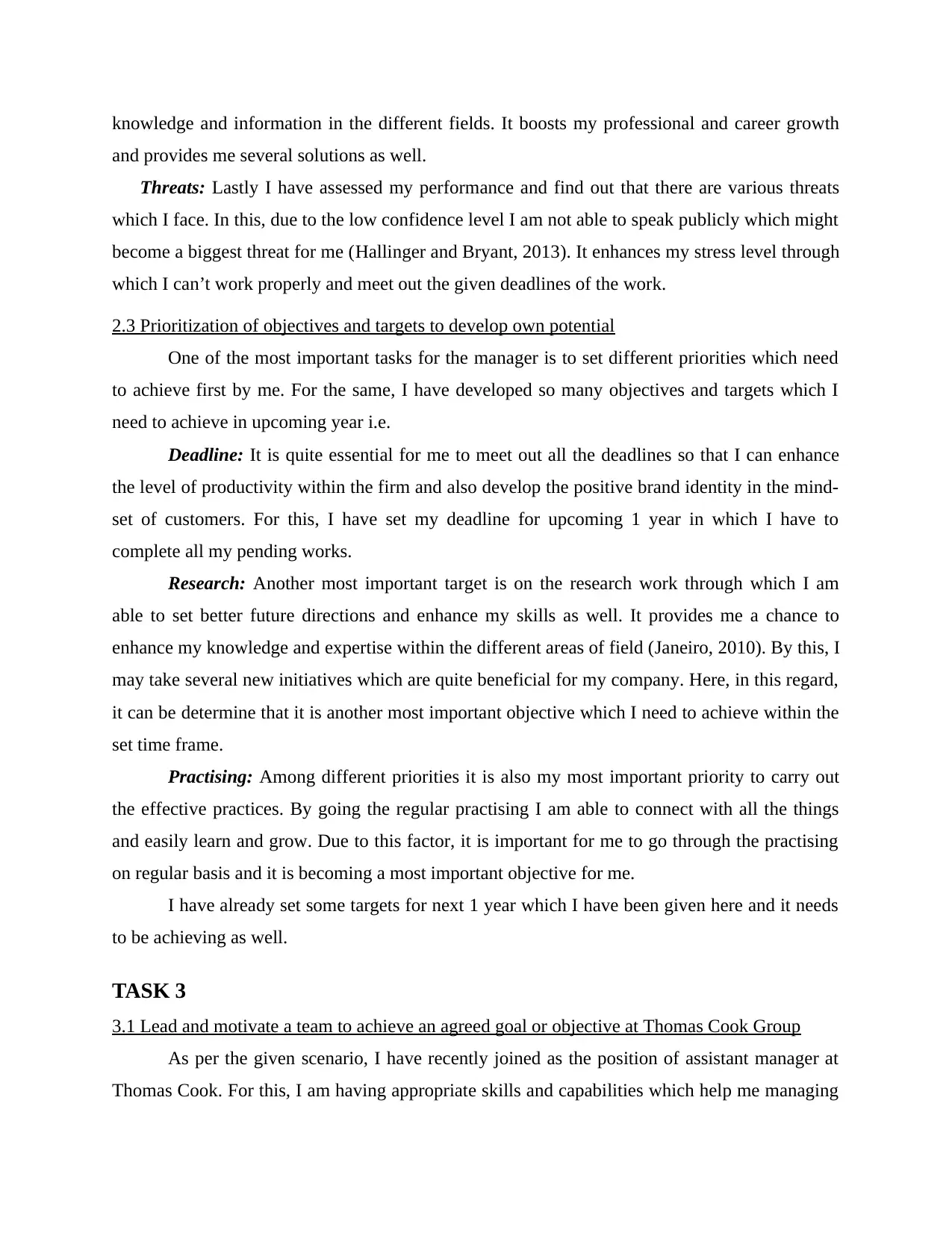
knowledge and information in the different fields. It boosts my professional and career growth
and provides me several solutions as well.
Threats: Lastly I have assessed my performance and find out that there are various threats
which I face. In this, due to the low confidence level I am not able to speak publicly which might
become a biggest threat for me (Hallinger and Bryant, 2013). It enhances my stress level through
which I can’t work properly and meet out the given deadlines of the work.
2.3 Prioritization of objectives and targets to develop own potential
One of the most important tasks for the manager is to set different priorities which need
to achieve first by me. For the same, I have developed so many objectives and targets which I
need to achieve in upcoming year i.e.
Deadline: It is quite essential for me to meet out all the deadlines so that I can enhance
the level of productivity within the firm and also develop the positive brand identity in the mind-
set of customers. For this, I have set my deadline for upcoming 1 year in which I have to
complete all my pending works.
Research: Another most important target is on the research work through which I am
able to set better future directions and enhance my skills as well. It provides me a chance to
enhance my knowledge and expertise within the different areas of field (Janeiro, 2010). By this, I
may take several new initiatives which are quite beneficial for my company. Here, in this regard,
it can be determine that it is another most important objective which I need to achieve within the
set time frame.
Practising: Among different priorities it is also my most important priority to carry out
the effective practices. By going the regular practising I am able to connect with all the things
and easily learn and grow. Due to this factor, it is important for me to go through the practising
on regular basis and it is becoming a most important objective for me.
I have already set some targets for next 1 year which I have been given here and it needs
to be achieving as well.
TASK 3
3.1 Lead and motivate a team to achieve an agreed goal or objective at Thomas Cook Group
As per the given scenario, I have recently joined as the position of assistant manager at
Thomas Cook. For this, I am having appropriate skills and capabilities which help me managing
and provides me several solutions as well.
Threats: Lastly I have assessed my performance and find out that there are various threats
which I face. In this, due to the low confidence level I am not able to speak publicly which might
become a biggest threat for me (Hallinger and Bryant, 2013). It enhances my stress level through
which I can’t work properly and meet out the given deadlines of the work.
2.3 Prioritization of objectives and targets to develop own potential
One of the most important tasks for the manager is to set different priorities which need
to achieve first by me. For the same, I have developed so many objectives and targets which I
need to achieve in upcoming year i.e.
Deadline: It is quite essential for me to meet out all the deadlines so that I can enhance
the level of productivity within the firm and also develop the positive brand identity in the mind-
set of customers. For this, I have set my deadline for upcoming 1 year in which I have to
complete all my pending works.
Research: Another most important target is on the research work through which I am
able to set better future directions and enhance my skills as well. It provides me a chance to
enhance my knowledge and expertise within the different areas of field (Janeiro, 2010). By this, I
may take several new initiatives which are quite beneficial for my company. Here, in this regard,
it can be determine that it is another most important objective which I need to achieve within the
set time frame.
Practising: Among different priorities it is also my most important priority to carry out
the effective practices. By going the regular practising I am able to connect with all the things
and easily learn and grow. Due to this factor, it is important for me to go through the practising
on regular basis and it is becoming a most important objective for me.
I have already set some targets for next 1 year which I have been given here and it needs
to be achieving as well.
TASK 3
3.1 Lead and motivate a team to achieve an agreed goal or objective at Thomas Cook Group
As per the given scenario, I have recently joined as the position of assistant manager at
Thomas Cook. For this, I am having appropriate skills and capabilities which help me managing
⊘ This is a preview!⊘
Do you want full access?
Subscribe today to unlock all pages.

Trusted by 1+ million students worldwide
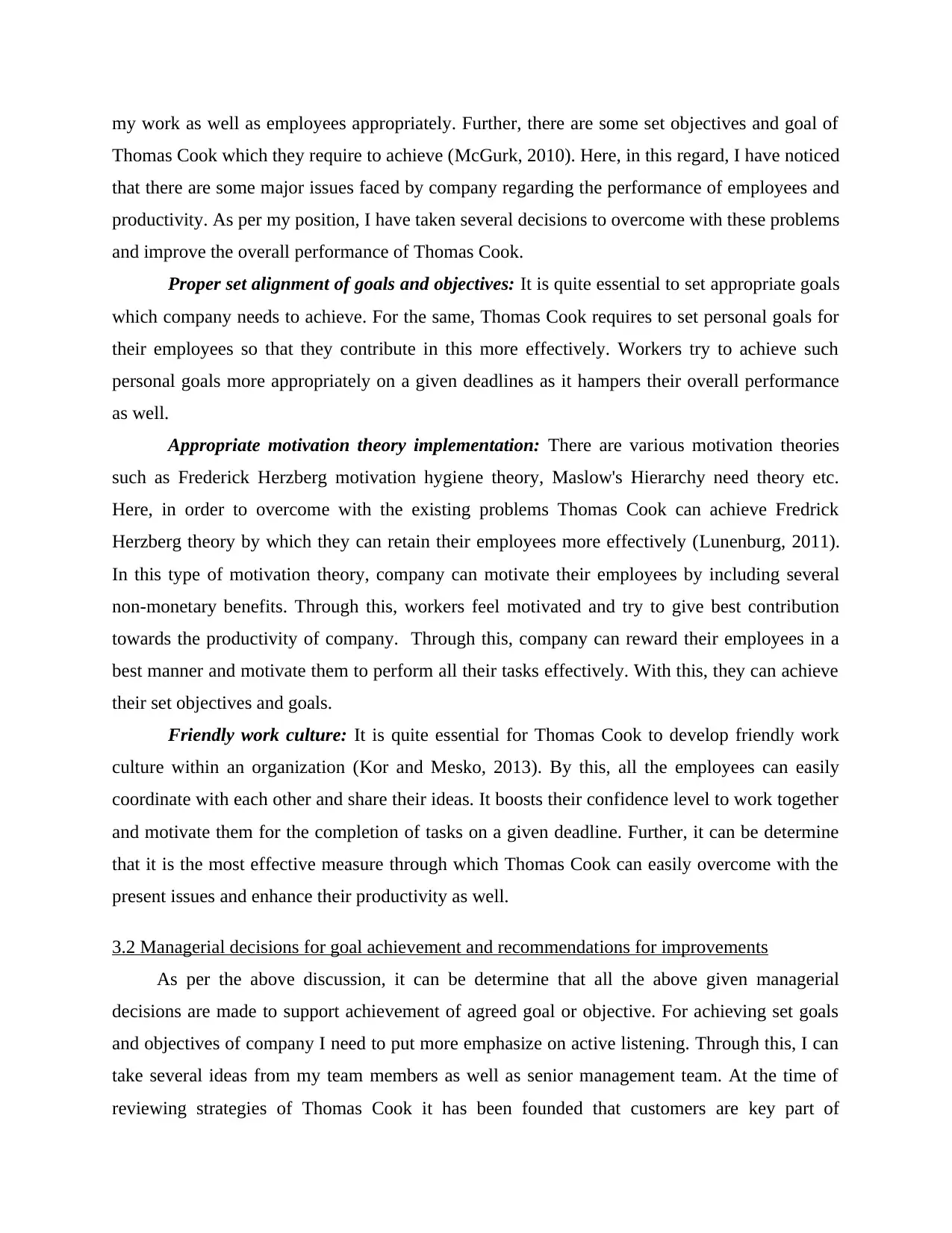
my work as well as employees appropriately. Further, there are some set objectives and goal of
Thomas Cook which they require to achieve (McGurk, 2010). Here, in this regard, I have noticed
that there are some major issues faced by company regarding the performance of employees and
productivity. As per my position, I have taken several decisions to overcome with these problems
and improve the overall performance of Thomas Cook.
Proper set alignment of goals and objectives: It is quite essential to set appropriate goals
which company needs to achieve. For the same, Thomas Cook requires to set personal goals for
their employees so that they contribute in this more effectively. Workers try to achieve such
personal goals more appropriately on a given deadlines as it hampers their overall performance
as well.
Appropriate motivation theory implementation: There are various motivation theories
such as Frederick Herzberg motivation hygiene theory, Maslow's Hierarchy need theory etc.
Here, in order to overcome with the existing problems Thomas Cook can achieve Fredrick
Herzberg theory by which they can retain their employees more effectively (Lunenburg, 2011).
In this type of motivation theory, company can motivate their employees by including several
non-monetary benefits. Through this, workers feel motivated and try to give best contribution
towards the productivity of company. Through this, company can reward their employees in a
best manner and motivate them to perform all their tasks effectively. With this, they can achieve
their set objectives and goals.
Friendly work culture: It is quite essential for Thomas Cook to develop friendly work
culture within an organization (Kor and Mesko, 2013). By this, all the employees can easily
coordinate with each other and share their ideas. It boosts their confidence level to work together
and motivate them for the completion of tasks on a given deadline. Further, it can be determine
that it is the most effective measure through which Thomas Cook can easily overcome with the
present issues and enhance their productivity as well.
3.2 Managerial decisions for goal achievement and recommendations for improvements
As per the above discussion, it can be determine that all the above given managerial
decisions are made to support achievement of agreed goal or objective. For achieving set goals
and objectives of company I need to put more emphasize on active listening. Through this, I can
take several ideas from my team members as well as senior management team. At the time of
reviewing strategies of Thomas Cook it has been founded that customers are key part of
Thomas Cook which they require to achieve (McGurk, 2010). Here, in this regard, I have noticed
that there are some major issues faced by company regarding the performance of employees and
productivity. As per my position, I have taken several decisions to overcome with these problems
and improve the overall performance of Thomas Cook.
Proper set alignment of goals and objectives: It is quite essential to set appropriate goals
which company needs to achieve. For the same, Thomas Cook requires to set personal goals for
their employees so that they contribute in this more effectively. Workers try to achieve such
personal goals more appropriately on a given deadlines as it hampers their overall performance
as well.
Appropriate motivation theory implementation: There are various motivation theories
such as Frederick Herzberg motivation hygiene theory, Maslow's Hierarchy need theory etc.
Here, in order to overcome with the existing problems Thomas Cook can achieve Fredrick
Herzberg theory by which they can retain their employees more effectively (Lunenburg, 2011).
In this type of motivation theory, company can motivate their employees by including several
non-monetary benefits. Through this, workers feel motivated and try to give best contribution
towards the productivity of company. Through this, company can reward their employees in a
best manner and motivate them to perform all their tasks effectively. With this, they can achieve
their set objectives and goals.
Friendly work culture: It is quite essential for Thomas Cook to develop friendly work
culture within an organization (Kor and Mesko, 2013). By this, all the employees can easily
coordinate with each other and share their ideas. It boosts their confidence level to work together
and motivate them for the completion of tasks on a given deadline. Further, it can be determine
that it is the most effective measure through which Thomas Cook can easily overcome with the
present issues and enhance their productivity as well.
3.2 Managerial decisions for goal achievement and recommendations for improvements
As per the above discussion, it can be determine that all the above given managerial
decisions are made to support achievement of agreed goal or objective. For achieving set goals
and objectives of company I need to put more emphasize on active listening. Through this, I can
take several ideas from my team members as well as senior management team. At the time of
reviewing strategies of Thomas Cook it has been founded that customers are key part of
Paraphrase This Document
Need a fresh take? Get an instant paraphrase of this document with our AI Paraphraser
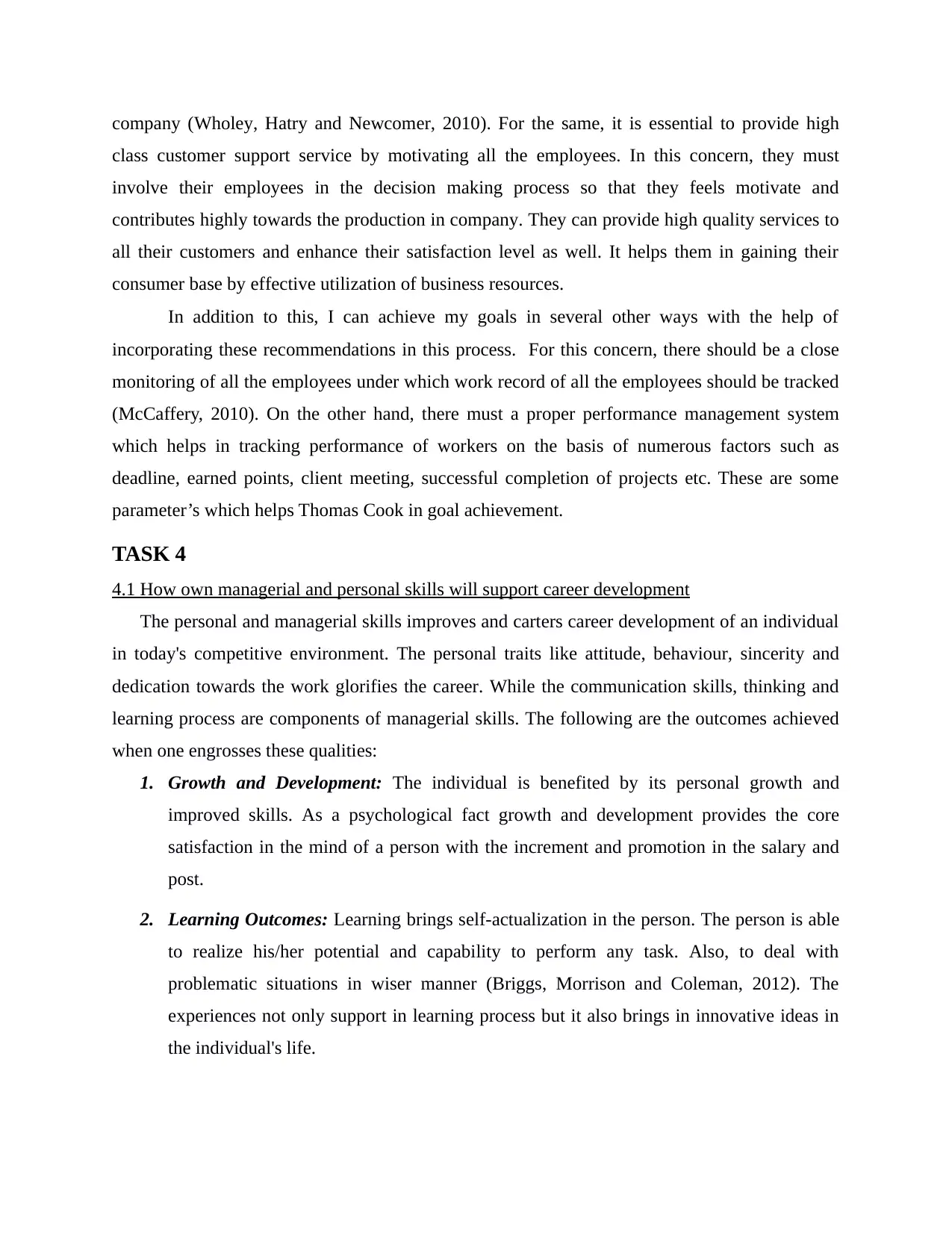
company (Wholey, Hatry and Newcomer, 2010). For the same, it is essential to provide high
class customer support service by motivating all the employees. In this concern, they must
involve their employees in the decision making process so that they feels motivate and
contributes highly towards the production in company. They can provide high quality services to
all their customers and enhance their satisfaction level as well. It helps them in gaining their
consumer base by effective utilization of business resources.
In addition to this, I can achieve my goals in several other ways with the help of
incorporating these recommendations in this process. For this concern, there should be a close
monitoring of all the employees under which work record of all the employees should be tracked
(McCaffery, 2010). On the other hand, there must a proper performance management system
which helps in tracking performance of workers on the basis of numerous factors such as
deadline, earned points, client meeting, successful completion of projects etc. These are some
parameter’s which helps Thomas Cook in goal achievement.
TASK 4
4.1 How own managerial and personal skills will support career development
The personal and managerial skills improves and carters career development of an individual
in today's competitive environment. The personal traits like attitude, behaviour, sincerity and
dedication towards the work glorifies the career. While the communication skills, thinking and
learning process are components of managerial skills. The following are the outcomes achieved
when one engrosses these qualities:
1. Growth and Development: The individual is benefited by its personal growth and
improved skills. As a psychological fact growth and development provides the core
satisfaction in the mind of a person with the increment and promotion in the salary and
post.
2. Learning Outcomes: Learning brings self-actualization in the person. The person is able
to realize his/her potential and capability to perform any task. Also, to deal with
problematic situations in wiser manner (Briggs, Morrison and Coleman, 2012). The
experiences not only support in learning process but it also brings in innovative ideas in
the individual's life.
class customer support service by motivating all the employees. In this concern, they must
involve their employees in the decision making process so that they feels motivate and
contributes highly towards the production in company. They can provide high quality services to
all their customers and enhance their satisfaction level as well. It helps them in gaining their
consumer base by effective utilization of business resources.
In addition to this, I can achieve my goals in several other ways with the help of
incorporating these recommendations in this process. For this concern, there should be a close
monitoring of all the employees under which work record of all the employees should be tracked
(McCaffery, 2010). On the other hand, there must a proper performance management system
which helps in tracking performance of workers on the basis of numerous factors such as
deadline, earned points, client meeting, successful completion of projects etc. These are some
parameter’s which helps Thomas Cook in goal achievement.
TASK 4
4.1 How own managerial and personal skills will support career development
The personal and managerial skills improves and carters career development of an individual
in today's competitive environment. The personal traits like attitude, behaviour, sincerity and
dedication towards the work glorifies the career. While the communication skills, thinking and
learning process are components of managerial skills. The following are the outcomes achieved
when one engrosses these qualities:
1. Growth and Development: The individual is benefited by its personal growth and
improved skills. As a psychological fact growth and development provides the core
satisfaction in the mind of a person with the increment and promotion in the salary and
post.
2. Learning Outcomes: Learning brings self-actualization in the person. The person is able
to realize his/her potential and capability to perform any task. Also, to deal with
problematic situations in wiser manner (Briggs, Morrison and Coleman, 2012). The
experiences not only support in learning process but it also brings in innovative ideas in
the individual's life.
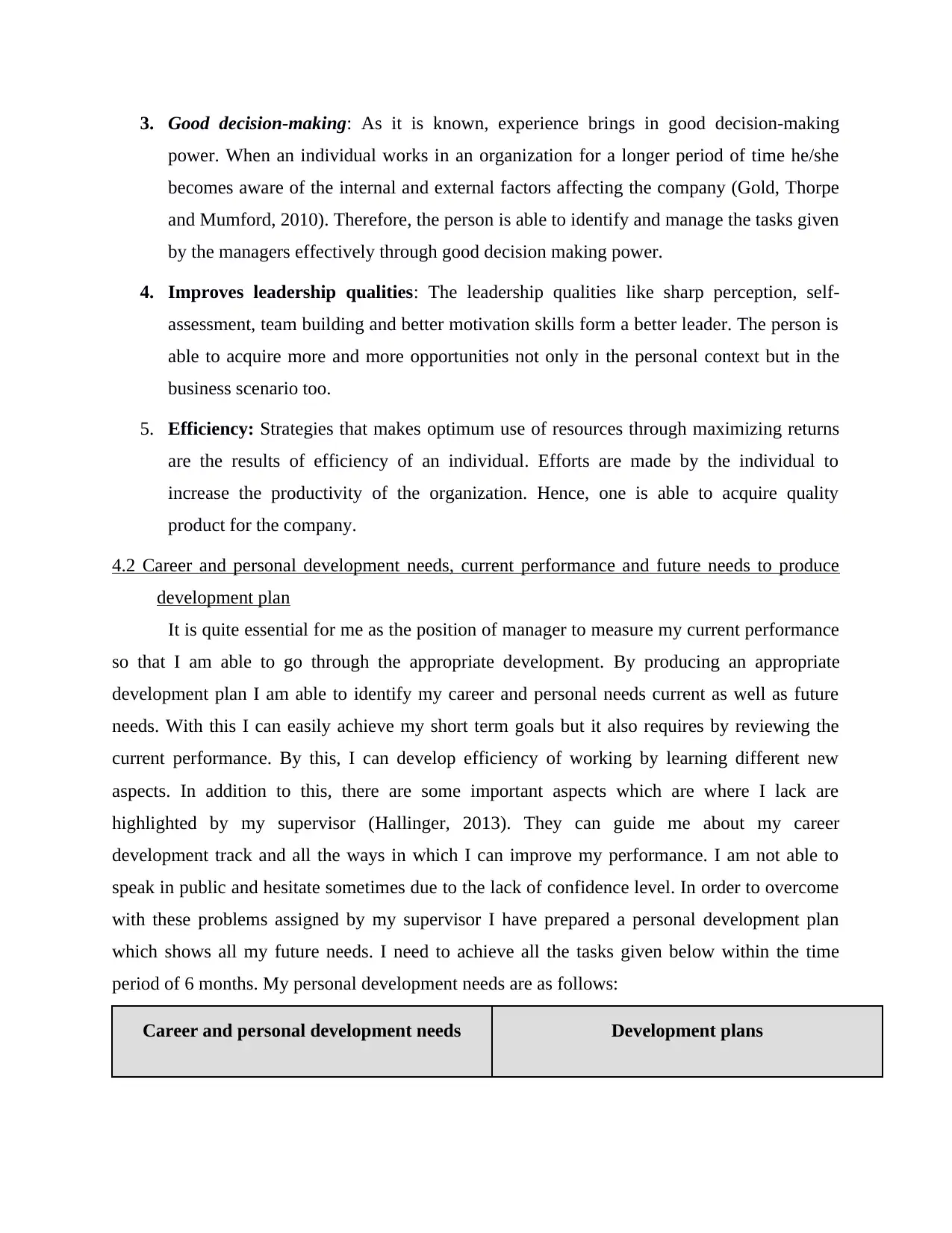
3. Good decision-making: As it is known, experience brings in good decision-making
power. When an individual works in an organization for a longer period of time he/she
becomes aware of the internal and external factors affecting the company (Gold, Thorpe
and Mumford, 2010). Therefore, the person is able to identify and manage the tasks given
by the managers effectively through good decision making power.
4. Improves leadership qualities: The leadership qualities like sharp perception, self-
assessment, team building and better motivation skills form a better leader. The person is
able to acquire more and more opportunities not only in the personal context but in the
business scenario too.
5. Efficiency: Strategies that makes optimum use of resources through maximizing returns
are the results of efficiency of an individual. Efforts are made by the individual to
increase the productivity of the organization. Hence, one is able to acquire quality
product for the company.
4.2 Career and personal development needs, current performance and future needs to produce
development plan
It is quite essential for me as the position of manager to measure my current performance
so that I am able to go through the appropriate development. By producing an appropriate
development plan I am able to identify my career and personal needs current as well as future
needs. With this I can easily achieve my short term goals but it also requires by reviewing the
current performance. By this, I can develop efficiency of working by learning different new
aspects. In addition to this, there are some important aspects which are where I lack are
highlighted by my supervisor (Hallinger, 2013). They can guide me about my career
development track and all the ways in which I can improve my performance. I am not able to
speak in public and hesitate sometimes due to the lack of confidence level. In order to overcome
with these problems assigned by my supervisor I have prepared a personal development plan
which shows all my future needs. I need to achieve all the tasks given below within the time
period of 6 months. My personal development needs are as follows:
Career and personal development needs Development plans
power. When an individual works in an organization for a longer period of time he/she
becomes aware of the internal and external factors affecting the company (Gold, Thorpe
and Mumford, 2010). Therefore, the person is able to identify and manage the tasks given
by the managers effectively through good decision making power.
4. Improves leadership qualities: The leadership qualities like sharp perception, self-
assessment, team building and better motivation skills form a better leader. The person is
able to acquire more and more opportunities not only in the personal context but in the
business scenario too.
5. Efficiency: Strategies that makes optimum use of resources through maximizing returns
are the results of efficiency of an individual. Efforts are made by the individual to
increase the productivity of the organization. Hence, one is able to acquire quality
product for the company.
4.2 Career and personal development needs, current performance and future needs to produce
development plan
It is quite essential for me as the position of manager to measure my current performance
so that I am able to go through the appropriate development. By producing an appropriate
development plan I am able to identify my career and personal needs current as well as future
needs. With this I can easily achieve my short term goals but it also requires by reviewing the
current performance. By this, I can develop efficiency of working by learning different new
aspects. In addition to this, there are some important aspects which are where I lack are
highlighted by my supervisor (Hallinger, 2013). They can guide me about my career
development track and all the ways in which I can improve my performance. I am not able to
speak in public and hesitate sometimes due to the lack of confidence level. In order to overcome
with these problems assigned by my supervisor I have prepared a personal development plan
which shows all my future needs. I need to achieve all the tasks given below within the time
period of 6 months. My personal development needs are as follows:
Career and personal development needs Development plans
⊘ This is a preview!⊘
Do you want full access?
Subscribe today to unlock all pages.

Trusted by 1+ million students worldwide
1 out of 15
Related Documents
Your All-in-One AI-Powered Toolkit for Academic Success.
+13062052269
info@desklib.com
Available 24*7 on WhatsApp / Email
![[object Object]](/_next/static/media/star-bottom.7253800d.svg)
Unlock your academic potential
Copyright © 2020–2025 A2Z Services. All Rights Reserved. Developed and managed by ZUCOL.





